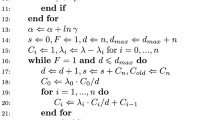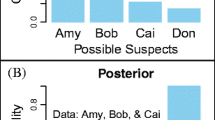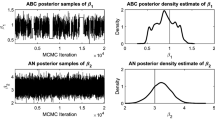Abstract
Considerable progress has been made in applying Markov chain Monte Carlo (MCMC) methods to the analysis of epidemic data. However, this likelihood based method can be inefficient due to the limited data available concerning an epidemic outbreak. This paper considers an alternative approach to studying epidemic data using Approximate Bayesian Computation (ABC) methodology. ABC is a simulation-based technique for obtaining an approximate sample from the posterior distribution of the parameters of the model and in an epidemic context is very easy to implement. A new approach to ABC is introduced which generates a set of values from the (approximate) posterior distribution of the parameters during each simulation rather than a single value. This is based upon coupling simulations with different sets of parameters and we call the resulting algorithm coupled ABC. The new methodology is used to analyse final size data for epidemics amongst communities partitioned into households. It is shown that for the epidemic data sets coupled ABC is more efficient than ABC and MCMC-ABC.
Similar content being viewed by others
References
Addy, C.L., Longini, I.M., Haber, M.: A generalized stochastic model for the analysis of infectious disease final size data. Biometrics 47, 961–974 (1991)
Baguelin, M., Newton, J.R., Demiris, N., Daly, J., Mumford, J.A., Wood, J.L.N.: Control of equine influenza: scenario testing using a realistic metapopulation model of spread. J. R. Soc. Interface 7, 67–79 (2010)
Bailey, N.T.J.: The Mathematical Theory of Infectious Diseases and Its Applications, 2nd edn. Griffin, London (1975)
Ball, F.G., Lyne, O.D.: Optimal vaccination policies for stochastic epidemics among a population of households. Math. Biosci. 177–178, 333–354 (2002)
Ball, F.G., Mollison, D., Scalia-Tomba, G.: Epidemics with two levels of mixing. Ann. Appl. Probab. 7, 46–89 (1997)
Beaumont, M., Zhang, W., Balding, D.: Approximate Bayesian computation in population genetics. Genetics 162, 2025–2035 (2002)
Bortot, P., Coles, S.G., Sisson, S.A.: Inference for stereological extremes. J. Am. Stat. Assoc. 102, 84–92 (2007)
Clancy, D., O’Neill, P.: Exact Bayesian inference and model selection for stochastic models of epidemics among a community of households. Scand. J. Stat. 34, 259–274 (2007)
Demiris, N., O’Neill, P.D.: Bayesian inference for stochastic epidemic models with two levels of mixing. Scand. J. Stat. 32, 265–280 (2005a)
Demiris, N., O’Neill, P.: Bayesian inference for stochastic multitype epidemics in structured populations via random graphs. J. R. Stat. Soc. B 67, 731–745 (2005b)
Demiris, N., O’Neill, P.: Computation of final outcome probabilities for the generalised stochastic epidemic. Stat. Comput. 16, 309–317 (2006)
Fox, J.P., Hall, C.E.: Viruses in Families. PSG Publishing, Littleton (1980)
Gibson, G.: Markov chain Monte Carlo methods for fitting spatio-temporal stochastic models in plant epidemiology. J. R. Stat. Soc. C 46, 215–233 (1997)
Gillespie, D.T.: A general method for numerically simulating the stochastic time evolution of coupled chemical reactions. J. Comput. Phys. 22, 403–434 (1976)
Grelaud, A., Robert, C.P., Marin, J.-M.: ABC methods for model choice in Gibbs random fields. C. R. Acad. Sci. Paris, Ser. I 347, 205–210 (2009)
Longini, I.M., Koopman, J.S., Monto, A.S., Fox, J.P.: Estimating household and community transmission parameters for influenza. Am. J. Epidemiol. 115, 736–751 (1982)
Ludwig, D.: Final size distributions for epidemics. Math. Biosci. 23, 33–46 (1975)
Marjoram, P., Molitor, J., Plagnol, V., Tavaré, S.: Markov chain Monte Carlo without likelihoods. Proc. Natl. Acad. Sci. USA 100, 15324–15328 (2003)
Monto, A.S., Koopman, J.S., Longini, I.M.: Tecumseh study of illness. XIII. Influenza infection and disease, 1976–1981. Am. J. Epidemiol. 121, 811–822 (1985)
Neal, P., Roberts, G.: Statistical inference and model selection for Hagelloch data set. Biostatistics 5, 249–261 (2004)
Neal, P., Roberts, G.: A case study in non-centering for data augmentation: Stochastic epidemics. Stat. Comput. 15, 315–327 (2005)
O’Neill, P.: Bayesian inference for stochastic multitype epidemics in structured populations using sample data. Biostatistics 10, 779–791 (2009)
O’Neill, P.D., Roberts, G.O.: Bayesian inference for partially observed stochastic epidemics. J. R. Stat. Soc. A 162, 121–129 (1999)
O’Neill, P.D., Balding, D.J., Becker, N.G., Eerola, M., Mollison, D.: Analyses of infectious disease data from household outbreaks by Markov chain Monte Carlo methods. J. R. Stat. Soc. C 49, 517–542 (2000)
Papaspoliopoulos, O., Roberts, G.O., Sköld, M.: Non-centered parameterisations for hierarchical models and data augmentation. In: Bernardo, J.M., Bayarri, M.J., Berger, J.O., Dawid, A.P., Heckerman, D., Smith, A.F.M., West, M. (eds.) Bayesian Statistics 7, pp. 307–326. Oxford University Press, London (2003)
Ratmann, O., Jørgensen, O., Hinkley, T., Stumpf, M., Richardson, S., Wiuf, C.: Using likelihood-free inference to compare evolutionary dynamics of the protein networks of H. pylori and P. falciparum. PLoS Comput. Biol. 3, e320 (2007)
Roberts, G.O., Gelman, A., Gilks, W.R.: Weak convergence and optimal scaling of Random walk Metropolis algorithms. Ann. Appl. Probab. 7, 110–120 (1997)
Sellke, T.: On the asymptotic distribution of the size of a stochastic epidemic. J. Appl. Probab. 20, 390–394 (1983)
Sisson, S.A., Fan, Y., Tanaka, M.M.: Sequential Monte Carlo without likelihoods. Proc. Natl. Acad. Sci. USA 104, 1760–1765 (2007)
Tallmon, D.A., Luikart, G., Beaumont, M.A.: Comparative Evaluation of a New Effective Population Size Estimator Based on Approximate Bayesian Computation. Genetics 167, 977–988 (2004)
Tavaré, S., Balding, D.J., Griffiths, R.C., Donnelly, P.: Inferring coalescence times from DNA sequence data. Genetics 145, 505–518 (1997)
Toni, T., Stumpf, M.P.H.: Simulation-based model selection for dynamical systems and population biology. Bioinformatics 26, 104–110 (2010)
White, S.: Stochastic epidemics conditioned on their final outcome. PhD Thesis, University of Nottingham (2009)
Author information
Authors and Affiliations
Corresponding author
Rights and permissions
About this article
Cite this article
Neal, P. Efficient likelihood-free Bayesian Computation for household epidemics. Stat Comput 22, 1239–1256 (2012). https://doi.org/10.1007/s11222-010-9216-x
Received:
Accepted:
Published:
Issue Date:
DOI: https://doi.org/10.1007/s11222-010-9216-x




